Whether you’re trying to increase planting efficiency or just looking for a traditional and trusted way to dig post holes, hole diggers, or auger drills, are a great way to make the most of your time in the garden.
The weird and wonderful world of post hole diggers is slightly confusing though, so stick with us as we break down the confusion between post hole diggers and auger drills, and when and where you need one. We’ll also review some of the best post hole diggers you can buy in 2025.
More...
Best Value

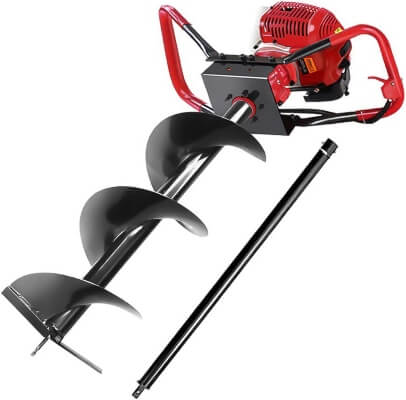
Premium Choice

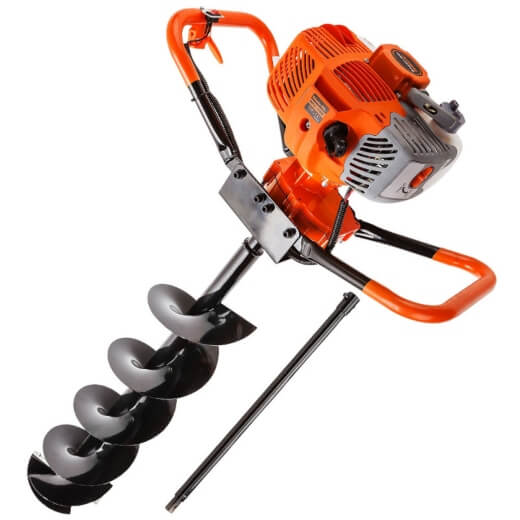
Best Post Hole Diggers for 2025
Product | Our Rating | Price | |
|---|---|---|---|
1. Giantz 66CC Petrol Post Hole Digger |  |  | |
2. Baumr-AG BPX-700 Petrol Post Hole Digger | 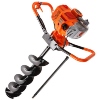 |  | |
3. Hassans Garden Augers Garden Power Planter |  | ||
4. TCBWFY Post Hole Digger for 3/8” Hex Drive Drill |  | ||
5. AMES Post Hole Digger & Ruler | |||
6. Draper 34894 Post Hole Digger | |||
7. Giantz 92CC Petrol Post Hole Digger | 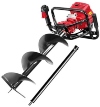 |
What is a Post Hole Digger?
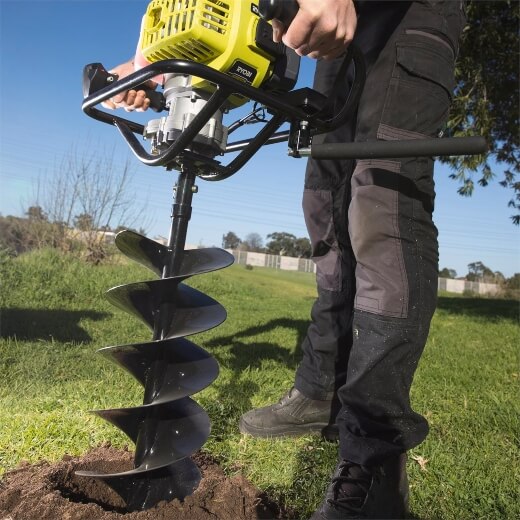
A post hole digger might sound pretty straight forward, but they have so many more uses than we give them credit for, especially for gardeners with back problems or limited mobility who don’t want to use a spade or bulb planters.
While we’re all used to setting fences in cement these days, traditional fences are built with treated or kiln dried hardwood timber set into stable tight fitting holes.
The timber is rot resistant in itself and these fences usually last well over thirty years, and with organic gardening and carbon neutral gardening on the rise as we gardeners seek to improve the way we garden for the sake of the planet, these traditional construction methods are coming back into fashion.
As well as an easy way to dig neat holes, all styles of post hole digger and earth drills are super efficient ways to plant bulbs and all kinds of plants in the garden. It doesn’t matter how used to digging you are, soil will always fall back into the hole.
Post hole diggers work by digging, then compressing soil so you can neatly remove clamps of earth as you dig, without risking the hole filling up with every swing of the spade.
Different Types of Post Hole Digger
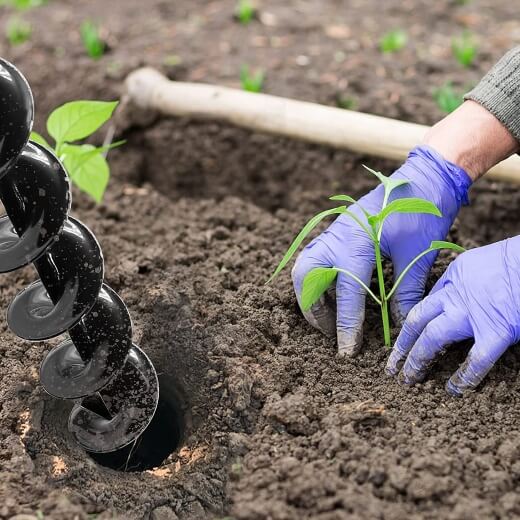
Auger Drills & Earth Drills
Auger drills, or earth drills, are usually petrol powered, but you can buy drill bits to accompany standard electric hand drills for small jobs too, and there are even manually operated auger drills which work like a giant corkscrew.
For me, the manually operated earth drills are pretty useless, and the power drills are really the only tool for the job when you’ve got a lot of posts to dig in, but they are more sustainable and more environmentally friendly as almost all auger drills are petrol powered.
They vary in price from £100-£500 for good auger drills, and the price is usually dictated by drill size power or brand, but as a basic guide a 60-90cc engine is plenty of power for the job, and where possible make sure you’re buying a post hole drill with multiple attachments so you’re not stuck with a single use tool.
Manual Post Hole Digger
Manual post hole diggers are the traditional option, and work like pinsirs. The long handles are hinged right down next to the half-circle blades, which cut through the soil and allow you to push the handles together to pressurise the earth.
This allows you to pull up compacted earth and either use it to plug back into the hole, or move it one side to plant small trees, perennials or veg in the hole.
For long swathes of new fencing, manual post hole diggers are a lot of work, but they are much more efficient than digging holes out with a spade and also give you neater edges so if you decide to use cement to set your fence posts, you’ll have a better set a the base as a result with less soil dilution on the edges.
How to Use a Post Hole Digger
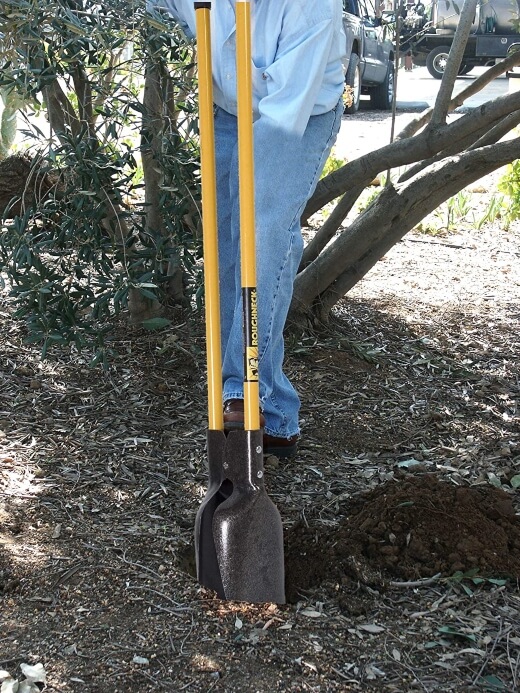
Before you buy a post hole digger you need to decide what you’re buying it for. Are you buying a new post hole digger to help bulb planting efficiency, or are you buying an auger drill to plant post holes?


Get Your Free Guide:
Master Growing Australian Natives eBook
A Must Have Complete Guide for Every Australian Garden
Get Your Free Guide:
Master Growing Australian Natives eBook
A Must Have Complete Guide for Every Australian Garden
If you’re planting fence holes, the size of the auger drill bit is crucial. If your fence posts are going to be 20cm, then a budget earth drill will do the trick, but for more load bearing posts like pergolas, swing sets, or awnings, you might need to think about 30cm augers which give you more space for cement to stabilise the posts.
For bulb planting though, whatever you use, it’s a simple rule - dig once. The more you dig out a hole with a post digger the more soil falls back in. So be confident, and dig once, plant your bulb, then open up the dig handles and allow the soil to fall back in and fill the hole.
Whichever post hole digger you use make sure to clean it well before storing it away again. Easily remove all of the dirt and mud with your retractable garden hose reel.
Post Hole Digger Reviews for 2025
1. Giantz 66CC Petrol Post Hole Digger

Giantz’s budget post hole digger is so well constructed that I’m still getting over its price. The anti-vibration handles make it super comfortable to use, and it’s 20cm auger drill bit makes large enough holes for any fence post.
While the 92cc option has more power, I actually prefer this model with it’s 66cc engine, partly because it’s more comfortable to use, and lighter, but mostly because the 20cm hole is sufficient, and smaller holes mean less cement.
And as we well know, cement isn’t exactly cheap these days, so there’s a big advantage of smaller sturdier holes for simple fences.
Pros
Cons
2. Baumr-AG BPX-700 Petrol Post Hole Digger

Baumr-AG makes good tools. That’s not something I need to convince anyone of, but this post hole digger from edisons just leaves everything else in its dust.
The anti-vibration handles make it incredibly comfortable to use, and the smaller 62cc engine means you’ve got enough power for a basic job, without being deafened in the process.
This post hole digger also comes with a 60cm extension (with the 80cm auger drill that’s a total depth of 140cm!).
Pros
Cons
3. Hassans Garden Augers Garden Power Planter
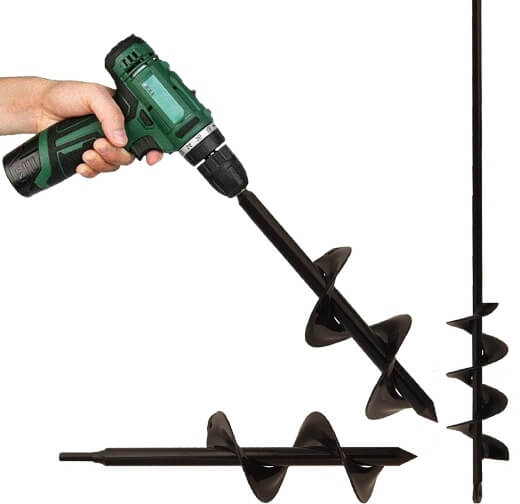
Post hole diggers are pretty limited in their applications - basically built to drill the ground, and that’s about it, so when you buy a post hole digger, or an auger drill bit, you’re usually limited to the size of hole you can drill out.
This multi-pack of auger drill bits by Hassans is brilliant value, with two different depths and widths supplied for the same price you’d usually buy a single auger bit.
Their solid steel blades make them incredibly durable, and they will easily drill out most small stones and hard earth with a standard electric hand drill, so you won’t even need to trail wires around the garden while you work.
Pros
Cons
4. TCBWFY Post Hole Digger for 3/8” Hex Drive Drill
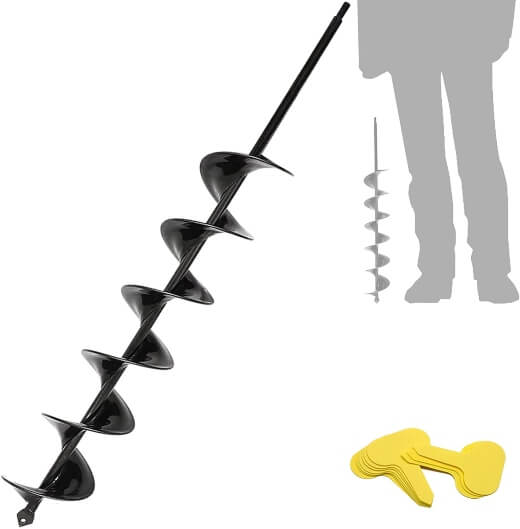
For planting, you’ll almost never need a 24” post hole drill bit because it’s complete overkill BUT for specialist trees, and hard stemmed perennials that need better drainage, digging deeper and faster means you have space to add drainage to the hole for young plants.
The main use for this is lightweight pergolas and plant supports, where you need deeper holes for better stability.
If you’re a dedicated organic gardener and hate the thought of cement in your garden, these will easily dig holes deep enough to support treated timber in the ground.
Pros
Cons
5. AMES Post Hole Digger & Ruler

If this was cheaper I’d be raving about it, but I can’t quite bring myself to recommend a timber handled landscaping tool that costs anything over $100, because no matter how well constructed your tools are, timber will always snap eventually, leaving you with a completely useless tool.
That’s not to say this is a bad post hole digger, but for the same price you can buy a powered post hole digger that’s capable of much more challenging work.
Pros
Cons
6. Draper 34894 Post Hole Digger

The draper post hole digger is much less comfortable to use than the AMES manual post hole digger, and the construction is definitely budget, but that’s passed on in the price.
This is a really good value budget post hole digger that will work well on soft ground and help you quickly extract earth far faster than a shovel.
Pros
Cons
7. Giantz 92CC Petrol Post Hole Digger

A seriously powerful post hole digger, which is perfect for commercial gardeners or landowners with large estates to maintain.
The 92cc engine makes incredibly light work of any ground, and it comes with a 30cm solid steel auger drill, as well as an extension rod for deeper holes.
It’s more expensive than other petrol augers, but that price is paid back in power.
Pros
Cons
Our Top Picks - Best Post Hole Digger Australia
Best Value Post Hole Digger


Giantz 66CC Post Hole Digger is a surprisingly good earth drill. Giantz are usually more of a budget tool manufacturer, but I can’t find anything budget about this auger drill, which seems to have been manufactured to a really high standard, and holds up to heavy work.
Best Premium Post Hole Digger


I honestly can’t rave enough about this earth drill from Baumr-AG. Baumr-AG BPX-700 Petrol Post Hole Digger got enough power for any post digging job; it’s lightweight; its amazing value; it’s got the longest drill bit on test; it’s pretty much perfect.
Ok, so there are similar products out there for a little bit less money, but if you’re going to invest in a post hole digger for serious work, particularly if you’re a commercial landscaper, then you need something you can trust, and Baumr has that in spades.
Post Hole Diggers Frequently Asked Questions
What is the easiest way to dig a post hole?
Petrol powered augers are the only option if you’ve got a large amount of post holes to dig. Manual post hole diggers are an excellent choice for small jobs or short fences, but for speed and ease of use, gas augers are by far the most user friendly way to dig post holes.
Is a post hole auger worth it?
It depends on the job. Post hole augers are worth it if you’ve got a lot of holes to dig, but for smaller jobs manual post hole diggers or clam shovels are usually more than enough to do the job.
How long should a post hole digger be?
For fence posts taller than 8ft they should be buried at least 3ft in the ground to stop them rocking, and to anchor them properly against any accidental impact. For posts of 4-6ft, 2ft deep is usually enough, but the deeper they are set into the ground the stronger they are.
How do I put a post in the ground without concrete?
Traditional fences were built using tools similar to modern post hole diggers, then set into the ground with 1/3 of the post’s height set into the ground to prevent rocking. If you plan on setting fences with no concrete or cement, then you must use hard-wood to prolong the life of the fence.
Explore additional gardening product reviews in the list below:
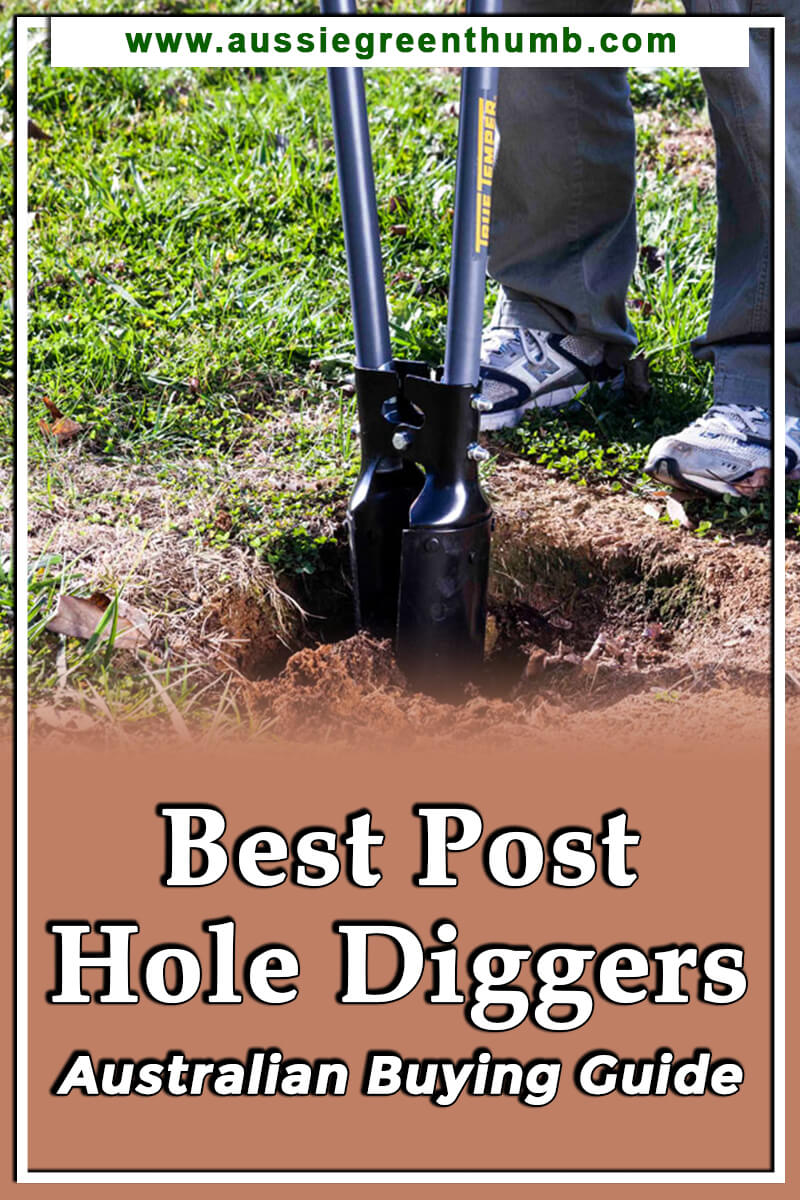
Make Hole Digging Easier By Using a Post Hole Digger
You can save yourself a heap of work with a new post hole digger or auger drill. Rather than digging, scooping, scraping and throwing soil over your shoulder as you slowly and painfully dig out fence post holes with a spade, earth drills and post hole augers mean you’ll never have that devastating moment where all your hard work is undone by the side of the hole collapsing in front of your weary eyes.
The reviews above are the best post hole diggers to buy online right now, and we’ve tried to choose a good selection of different types. All you need to do now is work out which post hole digger you need.
Published on January 28, 2022 by Gary Clarke
Last Updated on December 23, 2025




